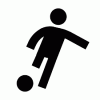Coming off a successful January camp that saw the US Men's National Team defeat Iceland and Canada, manager Jürgen Klinsmann and the US Soccer Federation received an open letter from the Youth Technical Working Group complaining about a lack of clear communication on a number of changes. During the NSCAA convention last month, there were a number of panels about the youth game, with many coaches bringing up questions about changes coming down the pipe line. The most controversial one is about the calendar year birth-date switch.
School year - calendar year
For years youth players have been put on teams that follow the school calendar year. However, under new changes from USSF, players will instead be sorted based upon birth year, causing some children to be bumped up a year ahead. This has caused some parents to be concerned, especially with Soccer House in Chicago being quiet as to any clarification. Normally USSF has a rather large presence at the NSCAA, but many reported that they weren't as heavily represented this year.
To head or not to head: that is the question
Another change that has been instituted due to a lawsuit is the no-heading part of the game. As of now, youth players 10 and under are prohibited from heading the ball due to concerns over concussions. For youths aged 11 to 13, there will be limits to the amount of heading players can do in training. However there are still a lot of questions as to how exactly this is to be implimented. For example, what happens when a youth player heads the ball during the game in midfield? Or how about when it happens in the box? These and other questions have yet to be answered fully.
Confusion abounds
Klinsmann, as Technical Director of USSF, is the man on top of the pyramid with all of these changes. Many of these, and others, have been his ideas in order to improve the technical skills of young players before they reach the top levels of MLS Academies and the college system. While most agree that these changes can help, there is confusion and lack of top-down leadership on how to practically impliment them.
A great idea is to institute short-sided games so that players can have more touches on the ball. Whether it is 7 v 7 or 4 v 4 or what have you, it's a fantastic idea to make players far more comfortable on the ball. This requires changes to field dimensions and goals that would cost thousands of dollars for each individual field. It's unclear whether organizations unable to raise the funds for such changes would be able to continue under these guidelines or if they could impliment other temporary changes to stay compliant.
Poor timing
As Klinsmann looks to get the senior national team back on track after a dismal 2015 campaign that saw embarassing losses to Jamaica, Panama and Mexico in official competitions, along with even worse friendly results during the latter part of the year, and with World Cup Qualifying set to restart next month and the Copa America this summer, this letter comes at a bad time. With so much already on his plate, it'll be difficult for him to address the concerns the YTWG has about these changes. What's clear is that he'll have to find time to address these concerns soon so that everyone can be clear on how to make the changes being asked of from USSF.
In order to help the YTWG, he'll likely have to rely on Jay Berhalter, the USSF's chief commercial director. This could cause more friction between the two as was reported last year in Sports Illustrated. It was reported then that Berhalter had taken on more and more of the day-to-day responsibilities of the Technical Director position and that there was friction between Klinsmann and Berhalter.
The next few months are likely to make or break Klinsmann's tenure with USSF.










































